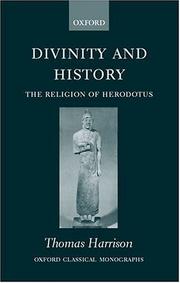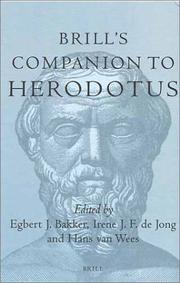| Listing 1 - 10 of 15 | << page >> |
Sort by
|
Book
ISBN: 9780199672868 0199672865 Year: 2015 Publisher: Oxford, United Kingdom : Oxford University Press,
Abstract | Keywords | Export | Availability | Bookmark
 Loading...
Loading...Choose an application
- Reference Manager
- EndNote
- RefWorks (Direct export to RefWorks)
Herodotus --- Herodotus. --- Criticism and interpretation. --- History (Herodotus) --- History (Herodotus).
Book
ISBN: 9780199560707 9780199560714 0199560706 0199560714 Year: 2015 Volume: *3 Publisher: Oxonii : e Typographeo Clarendoniano,
Abstract | Keywords | Export | Availability | Bookmark
 Loading...
Loading...Choose an application
- Reference Manager
- EndNote
- RefWorks (Direct export to RefWorks)
In this new edition of Herodotus' "Histories," Nigel Wilson has revised the original Oxford Classical Text by the Danish scholar C. Hude, published in 1906 and last revised in 1927. As well as incorporating much of the valuable work on the text that has been conducted since the original edition, in particular that of J. Enoch Powell and Paul Maas, Wilson has taken into account new readings from over 80 papyri. In addition, clarity in the apparatus criticus has been improved by the collation of two previously neglected medieval manuscripts, which belong to the so-called Roman family. A number of passages remain puzzling, and Wilson proposes new solutions and provides plausible emendations wherever possible. This new edition is accompanied by a commentary, 'Herodotea', written by the editor, in which he explains many of the editorial decisions he made while revising this key classical text.
Greece --- Iran --- History --- History, Ancient. --- Herodotus. --- History (Herodotus) --- To 146 B.C. --- Greece. --- History (Herodotus). --- Greece - History - Persian Wars, 500-449 B.C. --- Iran - History - To 640
Book
ISBN: 9788855532402 8855532405 Year: 2013 Publisher: Bologna Pàtron
Abstract | Keywords | Export | Availability | Bookmark
 Loading...
Loading...Choose an application
- Reference Manager
- EndNote
- RefWorks (Direct export to RefWorks)
Hérodote --- Textgeschichte. --- Herodotus, --- Herodotus. --- Criticism, Textual. --- Biblioteca apostolica vaticana. --- History (Herodotus). --- Vergilius Romanus.
Book
ISBN: 9789004242975 900424297X 9004250689 9789004250680 Year: 2016 Publisher: Leiden Brill
Abstract | Keywords | Export | Availability | Bookmark
 Loading...
Loading...Choose an application
- Reference Manager
- EndNote
- RefWorks (Direct export to RefWorks)
In Classical Greek Syntax: Wackernagel's Law in Herodotus , David Goldstein offers the first theoretically-informed study of second-position clitics in Ancient Greek and challenges the long-standing belief that Greek word order is ‟free” or beyond the reach of systematic analysis. On the basis of Herodotus’ Histories, he demonstrates that there are in fact systematic correspondences between clause structure and meaning. Crucial to this new model of the Greek clause is Wackernagel’s Law, the generalization that enclitics and postpositives occur in ‟second position,” as these classes of words provide a stable anchor for analyzing sentence structure. The results of this work not only restore word order as an interpretive dimension of Greek texts, but also provide a framework for the investigation of other areas of syntax in Greek, as well as archaic Indo-European more broadly.
Wackernagel, Jacob, --- History (Herodotus). --- Greek language --- Syntax. --- Herodotus. --- Wackernagel, Jakob, --- Yagebu Wakenage'er, --- 雅各布·瓦克纳格尔,
Book
ISBN: 9781108472753 9781108562805 9781108462143 Year: 2020 Publisher: Cambridge Cambridge University Press
Abstract | Keywords | Export | Availability | Bookmark
 Loading...
Loading...Choose an application
- Reference Manager
- EndNote
- RefWorks (Direct export to RefWorks)
"Herodotus in the Long Nineteenth Century traces the impact of Herodotus' Histories during a momentous period in world history - an era of heightened social mobility, religious controversy, scientific discovery and colonial expansion. Contributions by an international team of specialists in Greek historiography, classical archaeology, receptions, and nineteenth-century intellectual history shed new light on how the Histories were read, remembered, and re-imagined in historical writing and in an exciting array of real-world contexts: from the classrooms of English public schools and universities to the music hall, museum, or gallery; from the news-stand to the nursery; and from the banks of the Nile to the mountains of the Hindu Kush. They reveal not only how engagement with Herodotus' work permeated nationalist discourses of the period, but also the extent to which these national and disciplinary contexts helped shape the way both Herodotus and the ancient past have been understood and interpreted"--
History, Modern --- Historiography. --- Herodotus. --- Geschichtsschreibung. --- Rezeption. --- Historiography --- Herodotus, --- History (Herodotus). --- 1800-1899.
Book
ISBN: 9781474292665 1474292666 9781474292672 1474292674 Year: 2018 Publisher: London ; New York, NY : Bloomsbury Academic, an imprint of Bloomsbury Publishing Plc,
Abstract | Keywords | Export | Availability | Bookmark
 Loading...
Loading...Choose an application
- Reference Manager
- EndNote
- RefWorks (Direct export to RefWorks)
Modern scholarship judges Herodotus to be a more complex writer than his past readers supposed. His Histories is now being read in ways that are seemingly incompatible if not contradictory. This volume interrogates the various ways the text of the Histories has been and can be read by scholars: as the seminal text of our Ur-historian, as ethnology, literary art and fable. Our readings can bring out various guises of Herodotus himself: an author with the eye of a travel writer and the mind of an investigative journalist; a globalist, enlightened but superstitious; a rambling storyteller but a prose stylist; the so-called 'father of history' but in antiquity also labelled the 'father of lies'; both geographer and gossipmonger; both entertainer and an author whom social and cultural historians read and admire. Guiding students chapter-by-chapter through approaches as fascinating and often surprising as the original itself, Sean Sheehan goes beyond conventional Herodotus introductions and instead looks at the various interpretations of the work, which themselves shed light on the original. With text boxes highlighting key topics and indices of passages, this volume is an essential guide for students whether reading Herodotus for the first time, or returning to revisit this crucial text for later research.
Art appreciation. --- Herodotus. --- Appreciation. --- History (Herodotus). --- Herodotus --- Herodotus van Halicarnassus --- Herodot --- Gerodot --- Hērodotos --- Herodotos --- Erodoto --- Hérodote --- Heródoto --- הירודוטוס --- הרודוט --- הרודוטוס --- هردوت --- هيرودوت --- Ἡρόδοτος
Book
ISBN: 9783402144572 3402144573 9783402144589 Year: 2017 Publisher: Münster Aschendorff Verlag
Abstract | Keywords | Export | Availability | Bookmark
 Loading...
Loading...Choose an application
- Reference Manager
- EndNote
- RefWorks (Direct export to RefWorks)
Ekphrase --- Heliodor --- Klassik --- Art appreciation. --- Comparative literature. --- Ekphrasis. --- Greek literature --- Greek literature. --- History and criticism. --- Heliodorus, --- Herodotus. --- Homer. --- Cervantes Saavedra, Miguel de, --- Appreciation. --- Criticism and interpretation. --- Aethiopica (Heliodorus, of Emesa). --- History (Herodotus). --- Odyssey (Homer).

ISBN: 0198152914 0199253552 9780198152910 9780199253555 0191715115 Year: 2000 Publisher: Oxford : Clarendon Press,
Abstract | Keywords | Export | Availability | Bookmark
 Loading...
Loading...Choose an application
- Reference Manager
- EndNote
- RefWorks (Direct export to RefWorks)
Critics of Herodotus have generally shown an unease in the face of the religious passages of the Histories, a sense that he 'lets himself down' by delving into matters irrelevant to the proper purpose of history. They have tended consequently to latch on to isolated instances of skepticism in an attempt to vindicate Herodotus from imagined charges of obscurantism. Historians of Greek religion, on the other hand, by their concentration on ritual as the central feature of Greek religious experience, have often neglected the value of literary sources as evidence of religious belief; indeed the term belief has become something of a dirty word. In this book, the first full-length study of the subject in English, Dr Harrison not only places Herodotus' religious beliefs at the center of his conception of history, but - by seeing instances of skepticism and of belief in relation to one another, and by the use of analogy from anthropological literature - also redresses the recent emphasis on the centrality of ritual.
Herodotus --- Herodotus,. --- Herodotus. --- Religion. --- Greece --- Historiae (Herodotus) --- Religieuze opvattingen. --- Thèses et écrits académiques. --- Herodotus, --- Hérodote. --- Hérodote --- Hérodote, --- History (Herodotus). --- Historiae (Herodotus). --- 292 --- Godsdiensten van Grieken en Romeinen. Klassieke mythologie --- Religion

ISBN: 9004120602 9004217584 9789004120600 9789004217584 9004169660 Year: 2002 Publisher: Leiden Boston
Abstract | Keywords | Export | Availability | Bookmark
 Loading...
Loading...Choose an application
- Reference Manager
- EndNote
- RefWorks (Direct export to RefWorks)
Herodotus’ Histories can be read in many ways. Their literary qualities, never in dispute, can be more fully appreciated in the light of recent developments in the study of pragmatics, narratology, and orality. Their intellectual status has been radically reassessed: no longer regarded as naïve and ‘archaic’, the Histories are now seen as very much a product of the intellectual climate of their own day - not only subject to contemporary literary, religious, moral and social influences, but actively contributing to the great debates of their time. Their reliability as historical and ethnographic accounts, a matter of controversy even in antiquity, is being debated with renewed vigour and increasing sophistication. This Companion offers an up-to-date and in-depth overview of all these current approaches to Herodotus’ remarkable work.
History, Ancient --- Histoire ancienne --- Historiography. --- Historiographie --- Herodotus. --- Historiography --- Herodotus --- History [Ancient ] --- History (Herodotus) --- Hērodotou historiai (Herodotus) --- Historiai (Herodotus) --- Historiae (Herodotus) --- Mousai (Herodotus) --- Herodotus (Herodotus) --- Histories (Herodotus) --- Musae (Herodotus) --- Hērodotou Halikarnēssēos Historiōn logoi ennea (Herodotus) --- Historiōn logoi ennea (Herodotus) --- History, Ancient - Historiography
Book
ISBN: 9781780936130 1780936133 Year: 2015 Publisher: London ; New York : Bloomsbury Academic, an imprint of Bloomsbury Publishing Plc,
Abstract | Keywords | Export | Availability | Bookmark
 Loading...
Loading...Choose an application
- Reference Manager
- EndNote
- RefWorks (Direct export to RefWorks)
"Sophist Kings : Persians as Other sets forth a reading of Herodotus' Histories that highlights the consistency with which the Persians are depicted as sophists and Persian culture is infused with a sophistic ideology. The Persians as the Greek 'other' have a crucial role throughout Herodotus' Histories, but their characterisation is far divorced from historical reality. Instead, from their first appearance at the beginning of the Histories, Herodotus presents the Persians as adept in the argumentation of Greek sophists active in mid-5th century Athens. Moreover, Herodotus' construct of the Sophist King, in whom political reason serves human ambition, is used to explain the Achaemenid model of kingship whose rule is grounded in a theological knowledge of cosmic order and of divine justice as the political good. This original and in-depth study explores how the ideology which Herodotus ascribes to the Persians comes directly from fifth-century sophists whose arguments served to justify Athenian imperialism. The volume connects the ideological conflict between panhellenism and imperialism in Herodotus' contemporary Greece to his representation of the past conflict between Greek freedom and Persian imperialism. Detecting a universal paradigm, Sophist Kings argues that Herodotus was suggesting the Athenians should regard their own empire as a betrayal of the common cause by which they led the Greeks to victory in the Persian wars"--
Sophists (Greek philosophy) --- Other (Philosophy) --- Imperialism --- History --- Philosophy --- Civilization --- Historiography. --- International relations --- Other (Philosophy). --- Sophists (Greek philosophy). --- Perser --- König --- Sophistik --- Ancient --- General. --- Greece. --- History & Surveys --- Ancient & Classical. --- Herodotus. --- Herodotus --- Achaemenid dynasty, --- Herodotus, --- Criticism and interpretation. --- Persian Wars (Greece : 500-449 B.C.). --- History (Herodotus). --- To 640. --- Iran --- Greece --- Iran. --- Relations --- Perser. --- König. --- Sophistik.
| Listing 1 - 10 of 15 | << page >> |
Sort by
|

 Search
Search Feedback
Feedback About UniCat
About UniCat  Help
Help News
News